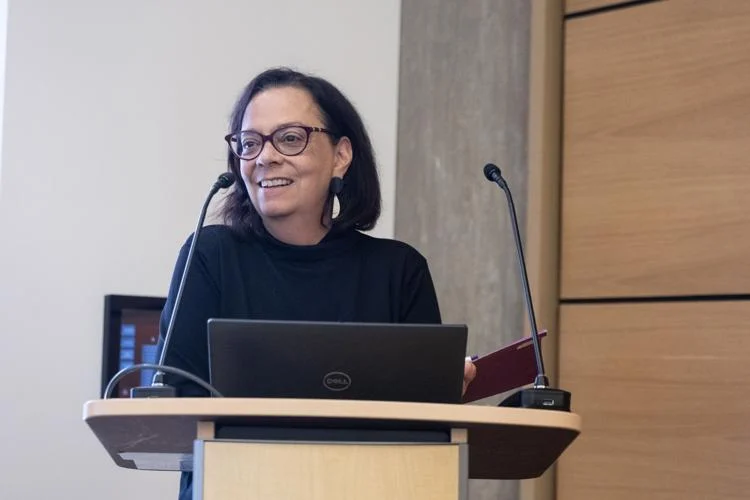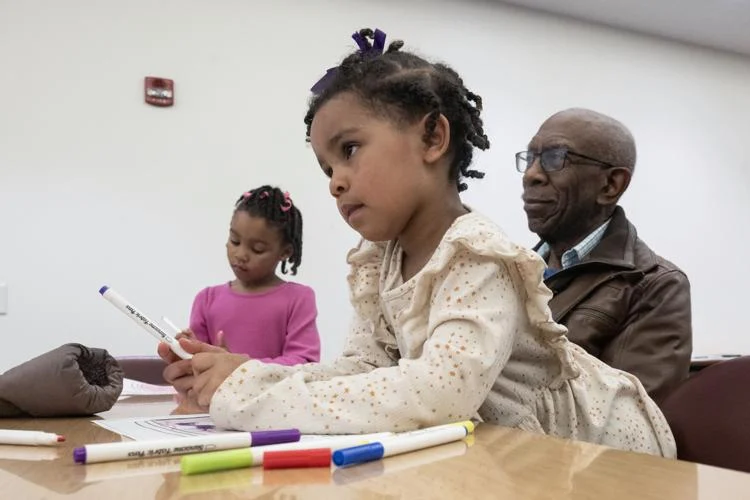CLAIRE HARTFIELD’S CHICAGO STORIES
Coretta Scott King Award-winning author talks hometown history at the Reg
Marc C. Monaghan / Mar 19, 2025 / Updated Mar 24, 2025
Author Claire Hartfield tells the story of how she came to write “A Few Red Drops: The Chicago Race Riot of 1919,” during “Lifting Voices,” an event celebrating Coretta Scott King Book Award-winners at the Regenstein Library, 1100 E. 57th St., March 15, 2025.
Storytelling is a deep tradition in Claire Hartfield’s family.
A Coretta Scott King Book Award-winner born and raised in Hyde Park, Hartfield said her grandmother, who traveled from Louisiana to the South Side of Chicago during the Great Migration, was an inveterate keeper of her family’s oral histories.
“She was a great storyteller,” Hartfield recalled Saturday, during a celebration of the awards at the University of Chicago’s Regenstein Library. Named after Coretta Scott King, the wife of Dr. Martin Luther King Jr., the award recognizes outstanding young adult and childrens works by African American authors.
“One hot July day in 1919, my grammie, who had just moved to Chicago from not more than a year before, was riding home from work on a streetcar,” said Hartfield. “She saw Black men and white men out in the streets, like right up next to the streetcar, fighting with one another and throwing rocks.”
The streetcar driver, she continued, was scared to stop. He went straight to the end of the line, far from her grandmother’s home, and made everyone get out.
“There were no Ubers back then,” Hartfield said. “So, she had to walk home through what she later found out was a full-fledged race riot that lasted an entire week.”
The Chicago Race Riot of 1919 was the most deadly of the more than 25 race riots that occurred throughout the United States that year. The fighting in Chicago broke out after Eugene Williams, a young Black swimmer, was stoned to death by white men at 29th Street Beach. After seven days of fighting, the riots killed 38 people – 23 of whom were Black and 15 of whom were white – injured 537 and left thousands homeless.
The story stayed with Hartfield, who subsequently lived through and witnessed her own set of race-related tragedies, killings and protests.
When King was assassinated in April of 1968, Hartfield was grocery shopping with her siblings and father at the now-shuttered Hyde Park Co-op. Suddenly, she recalled, a woman ran into the shop screaming “they’ve killed him, they’ve killed Martin.”
“It felt like the world was caving in,” Hartfield said.
The next day, she saw televised footage of people running through the streets and smashing windows. More than 100 riots took place across the United States after King’s assassination. In Chicago, the riots occurred mainly on the West Side, but also happened in the Woodlawn neighborhood.
“There was debris everywhere,” she said.
In the 1970s, when Hartfield was a student at Kenwood High School, she and her classmates took school buses to football games. During one trip to Gage Park, white kids threw rocks at her bus and spewed racial slurs.
“It felt overwhelming,” she said. “I didn’t really understand, viscerally, where all this hatred was coming from.”
After high school, Hartfield matriculated at Yale University, later returning to the South Side to attend the University of Chicago Law School. After graduating, she oversaw the development of school desegregation plans in Chicago and Rockford.
But in 2014, tragedy struck again – 18-year-old Michael Brown was shot and killed by a police officer in Ferguson, Missouri.
“After all of these years and all of my personal history, the memories of my youth and of my grandmother’s story just came roaring back in my mind,” Hartfield said. “I wanted to find out what had been going on in 1919, what had changed and what remains the same now. So, I started doing some research.”
Hartfield thought she could find the “seeds of the riot sprouting from events” that occurred in the year or two preceding 1919, but soon realized she had to go much further back. She began researching Chicago’s founding in 1837, and then turned to Reconstruction, the period of rebuilding the South after the Civil War.
She was struck reading about the “high hopes” Black people in the South and beyond had for Reconstruction. These were hopes, Hartfield said, that within a few years would “retreat into quiet resignation as segregation hardened in northern cities across the country.”
“Uncovering all of this history I could clearly see in a way that I never had before, the cycles of convulsion and complacency,” she continued.
Three years later, Hartfield published “A Few Red Drops: The Chicago Race Riot of 1919.”
(Left to right) Sisters Corinne and Samantha Hoyes sit and listen with their grandfather, Thomas Fisher, as artist Carmenita Peoples reads excerpts of Coretta Scott King Book Award-winners during “Lifting Voices,” an event celebrating the awards at the Regenstein Library, 1100 E. 57th St., March 15, 2025.
Authorship was not the only way that Hartfield acted on the memories of her youth.
As a child, Hartfield traveled downtown with her mother to see things like Buckingham Fountain, where she would take notice of all the street signs named after presidents – street signs absent of women and people of color.
“These were the people who should be remembered,” Hartfield recalled thinking. “I was a little kid, but I just assumed that that was the way things are.”
And so, in 2017, she and others formed a League of Women Voters of Chicago working group that successfully lobbied the city to rename Congress Parkway as Ida B. Wells Drive.
Concluding her talk at the Regenstein, Hartfield put her stories into the larger context of multicultural literature.
“Oral history, passed down through my family, the Shepherd-Rone-Hartfield family line, from generation to generation, has been central to my life.” Hartfield said. “But written history has expanded my understanding of the world beyond my family.”
“Books have allowed me, allow all of us, to immerse ourselves in the worlds we would not otherwise have access to, to hear the voices of those whose experience is different from ours.”
“To get it right, we must tell the stories, and we must read the stories of all our diverse communities, cultures and experiences.”
“Honoring Voices: The Coretta Scott King Book Awards” exhibition can be seen through May 15 during regular library hours on the fourth floor of the Regenstein Library, 1100 E. 57th Street.



